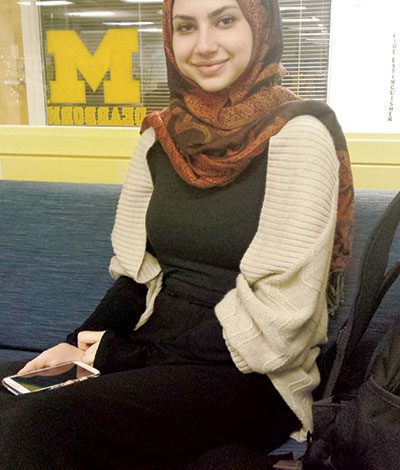
Historically, midterm elections have a lower turnout than presidential elections. And young people don’t always go to the polls. On Monday, The Arab American News asked students at the University of Michigan-Dearborn if they intended to vote in any of the races, including governor, representatives in the U.S. Senate and House and School Board.
“I’m going to vote because you don’t have the right to complain about an issue if you’re not willing to take action to make a change,” said Afeefah Seblini. “As soon as I do the research and am informed about it, I will go vote.”
Afeefah added that she is wary of the situation, because there is a lot of information she needs to research about the candidates before casting her vote. She would like to make a wise decision about who she wants to vote for and have an influence in the final outcome of the election.
“I think it’s really dangerous to be apathetic,” said Afifah Latif. “If you want to have a say, you should go vote.”
Afifah was also planning on researching candidates before voting.
“Advertisements are so influential and we need to be cautious about them,” she said.
“For this election I’m not voting, because I’m not convinced with any of these candidates,” said Aly Lakhani. He added that the candidates are being funded by the wealthy who have their own private interests.
“I don’t believe in voting for the lesser of two evils, because then you’ll be held accountable for who you voted for,” he said. “If I really believe in someone, I’ll go vote for them and campaign for them.”
“As an Arab and a woman, I am so thankful I have the right to vote,” said Saja Almusawi. “Almost a century ago women couldn’t vote and I want to exercise my right because I can.”
Almusawi added that she researched a few candidates. What stood out to her were education policies, jobs, and support for the Arab-American community.
“I was surprised by my friends when I told them I plan on voting,” she said. “A lot of them said voting doesn’t make a difference. It’s an illusion of choice.”
Her response to that is in order to make a change, one must be proactive in his/her community. The least a person can do is to start small by voting in order to make a bigger change.
“I wanted to vote, but I didn’t have a chance to do so,” said Mariam Asadullah after the election. “If I were to have voted, I would definitely look into who I’m voting for,” she said. She added that it’s difficult for politicians to get done what they promised, but a collective effort is what counts. She has not given up hope in the changes she can make by voting.






Leave a Reply